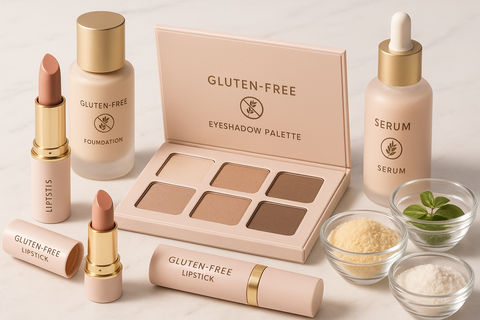Gluten-free formulation on cosmetics are gaining attention. Many people have celiac disease or gluten sensitivity. These conditions can cause reactions, even with small gluten exposure. Gluten is found in makeup products, skin care products, and lip products.
Some ingredients to watch for include hydrolyzed wheat gluten, wheat germ oil, and wheat proteins. These may seem harmless but can cause skin issues. People with wheat allergy or non-celiac gluten sensitivity should avoid them. Choosing gluten-free options lowers the risk.
Understanding the risk of gluten exposure through cosmetics
Gluten isn’t absorbed through healthy skin. But it can still be a problem. Lip products can lead to gluten transfer. Touching the mouth or face can cause accidental ingestion.
This matters for people with sensitive skin or immune issues. Even tiny amounts—measured in parts per billion gluten—can cause trouble. Ingredients like wheat bran extract or lactobacillus/oat/rye/wheat seed extract ferment should be avoided.
Benefits of using gluten-free skincare and makeup
Gluten-free makeup and skincare are helpful for all skin types. That includes dry skin, oily skin, and aging skin. They also support those with skin allergies or health conditions.
These products often contain safe and soothing ingredients. You might find hyaluronic acid, vitamin E, or grapeseed oil. These are nourishing without causing irritation. Many formulas use natural ingredients and skip harsh chemicals.
Essential facts about gluten-free cosmetic formulation
- Gluten-free makeup lowers the chance of allergic reactions
- Common sources of gluten include wheat germ oil and hydrolyzed wheat protein
- Accurate labeling follows US and EU rules using INCI names
- Raw product testing helps keep gluten levels low
- Gluten-free products are ideal for sensitive or allergy-prone skin
Labeling and regulatory considerations
Clear labels help people choose safe products. US and EU laws require correct naming of ingredients. Cosmetic manufacturing teams must check raw materials carefully.
Many products use ingredients that contain gluten by default. This is why clear formulation choices matter. Consumers trust what they can read and understand.
Accessibility matters too. Tools like bigger text, dyslexic fonts, screen readers, and color adjustments help users. They follow the Web Content Accessibility Guidelines. They also meet the Americans with Disabilities Act.
The consumer perspective and inclusive brand values
Shoppers are paying attention. They search for gluten-free skin care and gluten-free beauty products online. Many use filters to find safe options.
People want to avoid hidden gluten. That includes gluten transfer from makeup or body + haircare products. They also look for natural ingredients and clean labeling.
Skin type quizzes and simple descriptions help people make choices. They want products that support their health and lifestyle.
Support for a wide range of skin types and needs
Gluten-free formulas help many skin types. That includes combination skin, dry skin, and oily skin. These products avoid common irritants like wheat proteins and hydrolyzed wheat gluten.
At the same time, they provide benefits using high-quality ingredients. These products include fruit-pigment dyed makeup, mineral-based makeup, and vegan makeup. With proper care, brands can meet both health and beauty goals.
Please contact us to get started with gluten-free cosmetic formulation for your brand.
